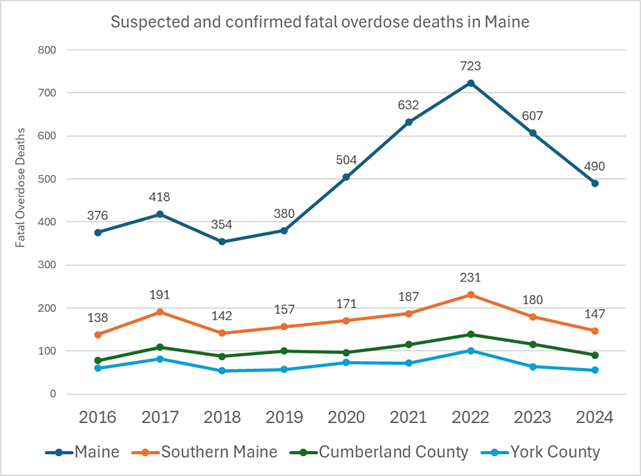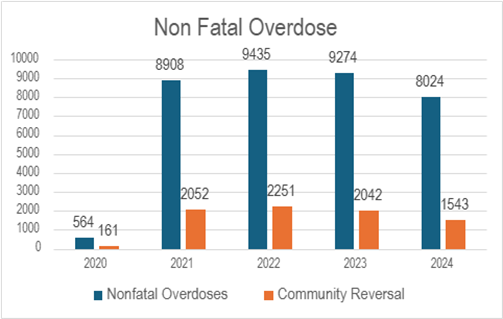lEARN HOW TO STOP AN OVERDOSE AND SAVE A LIFE
How to spot an overdose
How to Use Naloxone
naloxone
Naloxone is a lifesaving medicine that reverses an opioid overdose. It is an antagonist, meaning that it attaches to opioid receptors in the brain and blocks the effects of the opioid. Naloxone is safe to administer to all ages and will not harm someone if they are not overdosing on an opioid.
To learn where you can get Naloxone, visit Get Maine Naloxone at getmainenaloxone.org.
harm reduction
Harm reduction is an evidence-based approach used to help people who use drugs by equipping them with life-saving tools and information to create positive change and potentially save their lives. Harm Reduction practices prevent overdose and infectious disease transmission; improve physical, mental, and social wellbeing; and offer low barrier options for accessing health care services, including substance use and mental health treatment.
Overdose death & Reversal Data
From 2023 to 2024 there was a 19% decrease in overdose deaths statewide. This is the largest reduction in overdose deaths the state has seen in years, due in part to the prevalence of harm reduction supplies like naloxone, as well as greater access to and awareness of recovery resources.


A reduction in overdose deaths in Southern Maine supports the goals of Thrive2027, our community’s ten-year goals. Thrive2027 Goal 3 seeks to reduce preventable premature death by 10%. Learn more at thrive2027.org.
Maine's Good Samaritan Law
Maine’s Good Samaritan Law prevents a person from being arrested or prosecuted for certain violations if the grounds for that arrest or prosecution result from the person experiencing a drug-related overdose or seeking medical assistance for someone else who is. Learn more at knowyouroptions.me/good-samaritan-law.
What United way of Southern Maine is doing
HARM REDUCTION TRAINING
If you are interested in a comprehensive naloxone training for yourself or place of employment, please email nmisra@uwsme.org. The 30 minute training includes recognizing an overdose, administering naloxone, a brief history of the opioid epidemic, harm reduction strategies, the science of how naloxone works in the brain, legal liabilities, and resources available in the community. Participants receive free Naloxone to take with them, as part of the training.
RECOVERY FRIENDLY WORKPLACE
United Way of Southern Maine is proud to be a Recovery Friendly Workplace (RFW). RFWs encourage a healthy and safe environment where employers, employees, and communities can collaborate to create positive change and eliminate barriers for those impacted by addiction. For more information on how your business can also be recovery friendly, visit https://rfwmaine.org/.
211 MAINE
211 Maine is a free, confidential call center supported by United Way. 211 provides resources for substance use disorder including treatment, prevention, and recovery.
FOCUS ON ALICE
Much of United Way’s work is focused of many of the challenges facing ALICE households in Southern Maine. Economic stress can correlate with higher rates of substance use.
recovery resources
If you or a loved one are in need of support, there are resources available. There are multiple paths towards recovery, and working with a counselor, peer support specialist, or an OPTIONS liaison can help you find the path that is best for you.
211 is a free, confidential information and referral service that connects people of all ages across Maine to local services. A trained helpline employee can help you find a detox, treatment, and peer support options in your area.
OPTIONS (Overdose Prevention Through Intensive Outreach, Naloxone, and Safety) supports treatment, harm reduction, and recovery. There are OPTIONS liaisons in each Maine county that can support individuals in finding the right recovery pathway.
Maine Association of Recovery Residences manages the ethical and safety standards for recovery residences in the state of Maine and has a database of MARR-certified houses. Recovery-based housing can be supportive tools for individuals early in their recovery.
Recovery Community Centers provide peer recovery support services, advocacy activities, and recovery-focused education and outreach programs. Recovery Community Centers host many peer support groups, such as Alcoholics Anonymous, Narcotics Anonymous, Wellbriety, and more.